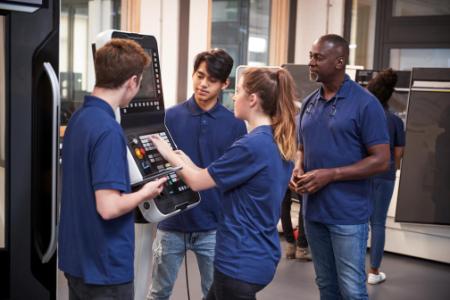Centre for Skills
Vocational education and training (VET) workforce and institutions
|
Teachers and trainers are the backbone of every education system, including in vocational education and training (VET). Various types of teachers and trainers make up the VET teaching workforce, including teachers of vocational subjects in general and VET programmes, teachers of general subjects in VET programmes, and in-company trainers or tutors of VET students in work-based learning. VET teachers and trainers generally have to have both pedagogical and occupational knowledge and experience. They prepare young people for work by teaching not only occupational skills but also transversal skills, such as basic and soft skills. They support the school-to-work transition of students with diverse backgrounds, including those who are struggling with academic studies, and adults in need of new, updated or improved skills. In light of structural changes in the labour market and associated changing skill needs, VET teachers and trainers need opportunities to keep their skill and knowledge up to date. They also need to keep abreast of new technologies for teaching and learning and innovative pedagogical approaches. VET teachers are guided and supported by institutional leaders, who oversee VET delivery in various types of institutional settings.
|
 |
Key publications
The Landscape of Providers of Vocational Education and Training
Teachers and Leaders in Vocational Education and Training
- Report summary
- Policy brief
- Infographic
- The main findings and recommendations from the publication “Teachers and Leaders in Vocational Education and Training” were presented during a dedicated webinar on 13 April 2021. Watch it here.
- OECD-UNESCO joint webinar in partnership with the World Bank, ETF and ILO: "Industry experience of TVET teachers in time of crisis" (8 October 2020)
Concept note and agenda | Webinar recording | Synthesis report
Preparing Vocational Teachers and Trainers
Further OECD reading on teachers
TALIS - The OECD Teaching and Learning International Survey
Education at a Glance 2022: OECD Indicators
Learn about the OECD Centre for Skills
Related Documents